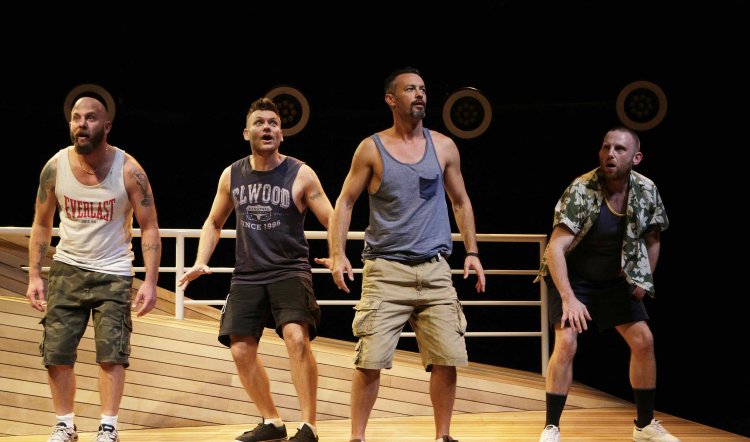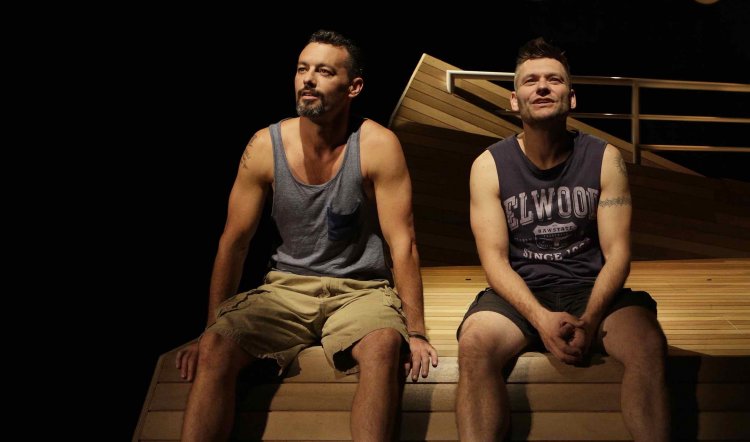
SAVAGES
SAVAGES, Darlinghurst Theatre Company at the Eternity Theatre, 1 April-1 May 2016. Photography by Helen White: above - Yure Covich, Josef Ber, Troy Harrison and Thomas Campbell; right: Harrison and Ber.
Melbourne’s Patricia Cornelius is one of the most awarded and lauded playwrights currently at work in Australia. She’s won the NSW Premier’s Literary Award, the Patrick White Playwrights Award and the Richard Wherret Prize for work that includes more than 25 plays. In its own right, Savages picked up the 2014 Victorian Premier’s Literary Award’s Prize for Drama, the Green Room Award for Writing and was nominated for an AWGIE and the Griffin Prize. All in all she’s won 10 AWGIEs and every prize known to Victoria and beyond. In other words, she is a brilliant writer for theatre.
All the above suggests something odd about the play-picking process in this town, because we rarely see her work in Sydney. Is it because Cornelius is unfashionably female and middle-aged? Is it because of her political background (co-founder of the Melbourne Workers Theatre)? Is it simply that she’s Victorian and therefore somehow invisible? Answers on a postcard would be appreciated. Meanwhile – grab this opportunity to find out why she is so highly regarded by critics and audiences alike south of the border.
Savages is 70 tautly-wrought minutes performed by an ensemble of four excellent actors and directed with precision and compassion by Tim Roseman. Rabbit (Josef Ber) so named because he roots like one, is all set to board a cruise ship for the “holiday of a lifetime” with his three mates, the chubby and pathetic Runt (Joseph Campbell), the domestic violence headline waiting to happen Craze (Yure Covich) and the relatively normal George (Troy Harrison). They are bursting with anticipation, exuberance and laddish bonhomie. The Pacific islands await. All is sunny.
The first dent in their hitherto unassailable sense of themselves as Men comes with the discovery that the “stateroom” is a claustrophobic, windowless box below the water line. However, their mood brightens again as they explore the various parts of the ship and its marvellous decor. (Sian James-Holland’s witty lighting states sketch in all of this over Jeremy Allen’s elegant suggestion of ship’s deck and rails.)
It’s at this point that a scene both poignant and ominous occurs in the portrayal of the friends. In it these very ordinary blokes who nevertheless enact an “I’m king of the world” moment without irony, are revealed as unimaginative, unambitious and un-entitled in the wider world as they marvel at what is obviously the tacky garishness of the ship. These are the lost boys and they have neither Wendy nor Peter Pan to guide them. With little said or done, the implication is clearly that there will be tears before bedtime.
Cornelius has created four sharply delineated characters whose shared masculinity is, at first, that combination of obnoxious yet charming we know and don’t love but nevertheless tolerate as Aussie mateship and “Oi oi oi”. Their insecurity is hidden (from themselves and each other) beneath rumbustious laddishness and is basically harmless. On the other hand, four is enough to form a pack and as the oft-repeated dream of a “holiday of a lifetime” begins to fray at the edges something darker bubbles to the surface.

Cornelius’s imagination was sparked by the 2002 tragedy aboard a Pacific island-bound cruise ship that resulted in the drug death of a female passenger. It was the callous behaviour of passengers and a gang of blokes alike as she lay comatose and dying that really appalled and bewildered public and judiciary alike. What the playwright does therefore is explore a range of behaviours and character traits that might start as disparate merry strands and yet finally knit together into something inexorably dark and terrible.
Savages is clever, absorbing, funny, touching and awful by turns. The boys (as men are called when society wants to let them off the hook of women hatred) are entirely credible and although you’d be fed up if they were at the next table, it wouldn’t occur that they might be unpleasant if you asked them to turn it down a bit. These guys aren’t monsters – and that makes them more monstrous.
Towards the end of this gripping production I began to feel really scared and was selfishly glad there were four or five rows of audience between me and them. The constant movement of the men (choreographed by movement director Julia Cotton) is punctuated and enhanced by Nate Edmondson’s sound and composition. And it’s mirrored in the rapid-fire, free-form and often overlapping verse style of the dialogue. It’s weirdly realistic and poetic and other than Caryl Churchill, there probably isn’t another playwright who would be as ambitious or be able to pull it off.
Darlinghurst is to be congratulated for staging this production and audiences should flock to it. Recommended.



